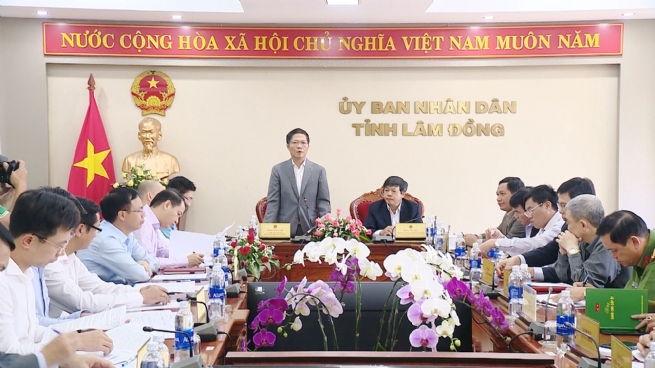Promoting unique local potential and strengths, Lam Dong province has focused on developing industry, trade and services, based on competitive advantages, towards modernity and sustainability, for local socioeconomic development.

In the 2016-2020 period, the province’s GRDP economic growth was estimated at 8.3% a year, of which the industry-construction sector grew by 9.5%, the agricultural sector climbed by 5% and the service sector expanded by 11.04%. The province has utilized local competitive advantages to shift the economic structure toward a desired pattern. In particular, Lam Dong industry has played an important role in the province’s socioeconomic development as it advanced 10.22% annually on average in 2016-2020. The value of industrial production (at constant prices of 2010) reached VND16,305 billion in 2019, up 12.71% year on year and equal 100.01% of the plan.
Currently, Lam Dong province is home to 9,190 industrial producers, including 17 State-owned enterprises, 9,133 private companies and 40 foreign-invested firms. Key industrial products include frozen vegetables (15,300 tons), dried vegetables (450 tons), silk yarn (1,650 tons), silk (3.3 million square meters), processed cashew nuts (1,230 tons), green coffee (150,000 tons), processed coffee (1,000 tons) and processed tea (38,000 tons).
The province’s export value was projected to rise 14.1% to US$720 million in 2019 as planned. Main agricultural exports consisted of coffee (123,000 tons, up 11.8%), processed tea (15,000 tons, up 15.4%), vegetables (13,000 tons, up 2.7%), cashew nuts (1,900 tons, up 2.7%), flowers (334 million branches, up 10.5%).
Especially, in the 2016-2019 period, many agricultural and foodstuff processing projects came into operation, for example the Artichoke Processing Plant invested by Lam Dong Pharmaceutical Joint Stock Company to make 300 tons of herbal tea a year; the export fruit and vegetable processing factory invested by Vien Son Joint Stock Company in Duc Trong district to process 6,500 tons of vegetables and sweet potatoes a year; the Sai Gon - Lam Dong Beer Brewery with a yearly capacity of 100 million liters in Loc Son Industrial Park; and Da Lat wool plant with an annual output of 2,000 tons in Phat Chi Industrial Zone.
In the coming time, like other localities in the country, Lam Dong industry is directed toward sustainable development and sustained added value by the Provincial Party Committee, the Provincial People’s Council and the Provincial People’s Committee. On that basis, the Department of Industry and Trade advised the Provincial People's Committee to submit to the Standing Board of the Provincial Party Committee to promulgate Action Plan 70-Ctr/TU dated October 6, 2018 to carry out Resolution 23-NQ/TW dated March 22, 2018 of the Politburo on national industrial development policy to 2030, with a vision to 2045; consulted the Provincial People's Committee to issue Plan 6250/KH-UBND dated September 27, 2019 on implementation of the Action Program 70 to develop competitive industries toward modernity and sustainability; and raised the share of industry in the economic structure. By 2030, Lam Dong province will accomplish industrialization and modernization goals to become a basically modern industrial province and have highly competitive industrial products. By 2045, Lam Dong will have a modern developed industry.
To achieve those goals, the Department of Industry and Trade will work with other bodies and localities to focus on eight key tasks and solutions: Reviewing, modifying and supplementing policies on spatial distribution and industrial restructuring; developing priority industries based on local input sources and competitive advantages; creating favorable investment and business environment for industrial development; supporting development of industrial enterprises; improving the quality of industrial human resources; carrying out policies on scientific and technological development for industrial development; strictly and effectively managing and utilizing natural resources and minerals, protecting the environment and adapting to climate change in the course of industrial development; improving the leadership capacity of Party at all levels; promoting effectiveness of state management; and promoting people's ownership in the formulation and implementation of national industrial development policies.
Source: Vietnam Bunnies Forum